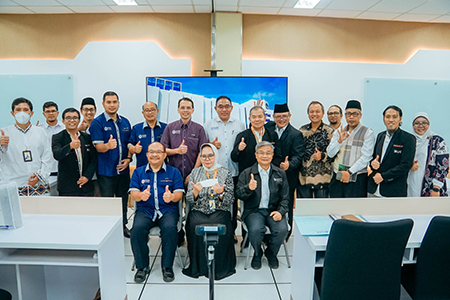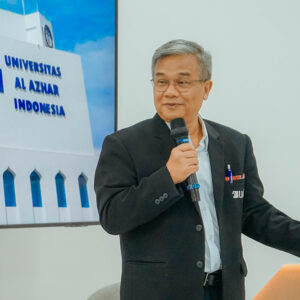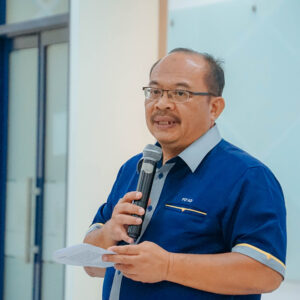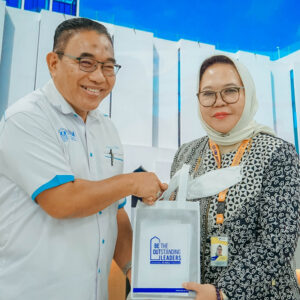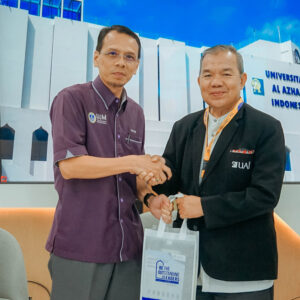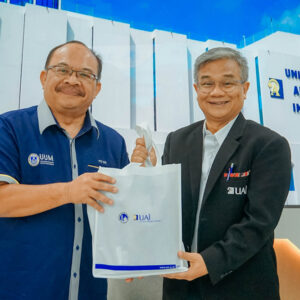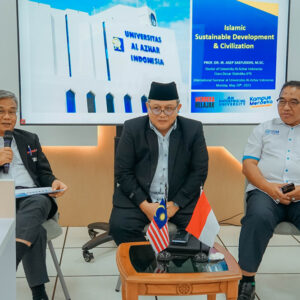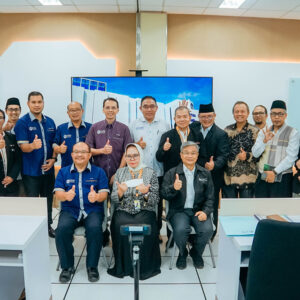The current condition of revolution in industry and society shows the sustainable development paradigm as the crucial foundation to meet the necessary conditions in dealing with the potentials and drawbacks simultaneously. The big number of empirical evidence in many fields, prior to the industry and development that has implemented the irrelevant paradigm and principles when exploring the resources (natural resources primarily). Consequently, as a global issue in the sustainable development (SDGs), climate change brings many negative changes to around the globe, also another deleterious thing that impacts human life, environment, and so on. Having these matters as the global agenda and principles, the Muslim needs to have reviews and further discussion in how the community sees the perspectives predominantly which is based on al-Qur’an and Sunnah as two prime slam sources.
In response to this, University Al-Azhar Indonesia (UAI) and Universiti Utara Malaysia (UUM) conducted an International Seminar, Nurturing Islamic Sustainable Development & Civilization in Higher Education on Monday (29/5) in Room 317 A-B, UAI and Zoom. The event was attended by six delegations of UUM who are Prof. Dr. Mohd Fo’ad Sakdan (Vice-Chancellor), Prof. Dr. Yahya Don (Dean of School of Education of UUM), Assoc. Prof. Dr. Mohd. Khairie Ahmad (Dean of School of Multimedia Technology and Communication), Assoc. Prof. Dr. Arpah Abu Bakar (Director of Centre for International Affairs and Cooperation, CIAC), Dr. Azahar Kasim (Deputy Director of UUM Corporate Communication), and Mr. Mohd Azri Abdul Aziz (Assistant Director of CIAC of UUM).
In the first place, Prof. Asep welcomed all the UUM’s delegations and he stated that it is such a pleasure to UAI for having all the UUM’s delegations. Last November, he really had a good time visiting UUM in Kedah. He also added that as today everyone will have a platform in taking a consideration as Muslim society in discussing this significant topic for the future, it is his hope that this seminar will create the result that can be brought to each university as the foundation in higher education institutions which are integrated with Islamic values. On the occasion, Prof. Dr. Mohd Fo’ad Sakdan expressed his gratitude in the opening remarks for UAI for welcoming all of his delegations. UUM and UAI have a tight relation and he expected to have another collaboration that can be created after this event.
As one of speakers of today’s seminar, Prof. Asep explained that Islam and sustainability in the essence have meeting points, in this context allied with development. However, referring to the root of the concept of development, based on Islam and the UN –that being a global agenda- has different departure or principle. Islam perspective looks at the development prior to human beings as the end and for the only God’s sake (Ibadah), while the other is based on a positivistic paradigm primarily economy in the early period. Humans act as the manager of the universe not the owner, the almighty is the only owner, conversely this is not being the UN principle or foundation on development. Nevertheless, there are some meeting points between SDGs that were coined by the UN and what has been taught in Islam for many indicators or targets that formulated in SDGs (17 points). Even some differences also will exist.
Equally important, Prof. Yahya emphasized that executive certificate in Islamic and community leadership (skill) has taken a role in nurturing Islamic sustainable development and civilization in UUM for the past years. This program has several objectives to instil in UUM students the virtues and fundamental principles of Islam, to provide education to students in a manner that does not expose them to any behaviours or attitudes that may be considered derogatory towards individuals of the Muslim faith, and to foster a Muslim identity that is unwavering in its commitment to faith and piety, distinguished by virtuous attributes, and etc. Moreover, this program is scheduled to be implemented for a duration of three semesters and participants of the skill programme will undergo the Self-Leadership Assessment Test towards the conclusion of the initial semester, followed by subsequent tests at the culmination of the second and third semesters. This could be an example in how we act as Islamic higher education who are responsible for the future of Islam.
All things considered, H.E. Dr. K.H. Husnan Bey Fananie (Lecturer at Faculty of Psychology and Education) concluded the event that the re-actualization of Islamic value and thought that had achieved the glorious period considered its relevance to not only answering the questions of framework but also placing it as “the actual concept”. This brings the implementation of SDGs and Islam have many similarities and meeting points to be conceptualized as one idea. The SDGs in Islamic way and paradigm, here namely Islamic Sustainable Development every now and then will be very relevant, even need to be reviewed constantly especially for the Muslim youth as the next generation. By having this chance, hopefully Indonesia and Malaysia could be the gate of Southeast Asia and can be the light for the future of Islam.
Joining the agenda from UAI, Dr. Zirmansyah, M.Pd., (Vice Rector I for Academic Field), Ir. Ade Suryanti, M.M., IPU. (Vice Rector II for Human Resources Field), Dr. Faisal Hendra, Lc., M.A. (Vice Rector III for Student Affairs and Alumni Field), all the Dean and Vice Dean, Dr. Ir. Ade Jamal (Head of Center for Computer and Digital Innovation), Dr. rer. nat. Yunus Effendi, S.Pd., M.Si., M.Sc. (Head of Institute for Research and Community Service), and all the Heads of Program Study. Finally, the event was ended by a souvenir handover by the two Rectors of each university. (MN/TSH)
- Universitas Al-Azhar Indonesia
- Universitas Al-Azhar Indonesia
- Universitas Al-Azhar Indonesia
- Universitas Al-Azhar Indonesia
- Universitas Al-Azhar Indonesia
- Universitas Al-Azhar Indonesia
- Universitas Al-Azhar Indonesia
- Universitas Al-Azhar Indonesia

